An overall philosophy, not a system set in stone
Host: Country Downs Station
Written by Nikki Elezovich – Owner, Country Downs Station.
I must admit that writing the blogs for this year has also proved to be a bit of a struggle. Mainly because as the years progress and the more everyone who is a part of Central Station describes, explains, and takes all of you on a journey into their lives and work environments, there is the potential for many posts to be very similar and nobody wants to read the 10th blog about the same thing! In addition, there is only so much that people care to know about us and our way of doing things. If we keep banging on about the same stuff each year it will soon get tiresome!
So as I sat one night contemplating (procrastinating!) what we were going to write about for our host week, I got distracted by a newly hatched gecko, all of about 1 cm long, scampering along the ceiling hunting but also dodging the older and much larger geckos who were also out hunting for the night. Watching this tiny little predator go about it’s business of surviving and living gave me a bit of an epiphany. What would be better to talk about than our own progression in the overall understanding of the ‘holistic’ system that we are striving to achieve in our enterprise. Please understand, that when I say ‘holistic’ I am not actually referring to any particular strategy or practices, I am using it in a very loose fashion that is encompassing the belief and principles of, rather than the practices and implementation of the ideals.
Anyway, back to the gecko. My house – well – it is closer to nature than most people’s houses (that I know of anyway) and to be honest I don’t have time to clean and when I do have time, I don’t want to spend my time cleaning my house! So consequently, my ceilings/ fans/ walls have an extensive community of spiders and their webs, gecko’s, dust/ dirt and frogs etc., in residence. This can get frustrating and a little offensive sometimes, particularly when you are eating your dinner at the table and a large dollop of gecko poo lands on your plate or, even more sacrilegious, in your wine. Or worse is when you are happily sleeping away at night and the resident frog decides to get all territorial and sidles along the high wall beam, takes careful aim and proceeds to urinate all over your head!
Back on track though, what has evolved in our house is that over time a certain ‘balance’ has eventuated with the spiders, geckos, and frogs etc., all living together within the same environment and obviously getting a great feed as there are plenty of them and they are all fat! At this point I know you are all thinking “Where the hell is this going? And when?”, but this is the epiphany: My house is actually the ultimate success in what we are trying to achieve in our cattle business! No, I haven’t gone completely troppo – and yes I am over-exaggerating, a lot – but in essence this is what we are trying to achieve.
Diversity is the key to nature. Diversity means a healthy and balanced ecosystem (it apparently also means a less than acceptable standard of cleanliness!) and a healthy, balanced ecosystem, if managed correctly, is one that is not only sustainable but flourishes and improves, and most importantly is self perpetuating. Thus as a scientist (the biological sort), to see diversity within my own home is a big thing and maybe you can now understand how I perceive such a large flaw in my ability to housekeep as an epiphany! Or just an excuse to not have to clean!
It is not a new thing to be wanting a healthy, balanced environment around us, pretty much all of us are aware of, or have heard of the terms ‘biodiversity’, ‘healthy ecosystem’ and ‘balance of nature’. But really, what does this actually mean? Most of us know that, in an extremely simplified version, this means everything is cruising along nicely and all is well within the environment around us. However, when is life (and nature) ever that easy? Nature is in a constant state of flux (which by the way is how it manages to balance itself . . . great strategy really), and this flux is essentially the bane of every farmer.
We are daily at the whim of what nature decides to throw at us. We have all seen the devastating and also the wonderful ways that our environment can impact us. But what if we could re-learn to see and understand how these complex interactions are occurring, then imagine being able to make management decisions based on knowledge like this rather than simply reacting to events as they happen? Whilst we will never be able to predict nature, it would be nice if we were able to make plans and management decisions that have the flexibility to withstand or hold up to the variety of impacts that nature can and will throw at us. This is the crux of diversity, it allows for flexibility and therefore the potential to get through hard times relatively unscathed.
It can be as simplistic as providing your animals with their basic needs and they will manage the rest themselves, which is a very basic explanation of the direction we wanting to head in. It is also why we have taken on a very different approach to livestock management. It is very appealing to imagine ‘controlling’ your animals to do what you want, but by them doing it themselves. Why would they? Because they want to! Confusing? Yes – it can be, but we humans have a tendency to over-analyse things (I am extremely guilty of that) and yet the truth is, when we simplify things down, it not only becomes manageable but is also not that complicated.
In essence, the last 12 to 18 months have been some of the hardest we have had to endure. However, I believe that for Kurt and I and our boys, it has really lead to a much deeper understanding of what it is we are trying to achieve and where it is we want to be in the long term future. We have questioned so many long held traditional beliefs and methodology of pastoral activities and have come out of that with some fascinating ideas and strategies. Whether they come to fruition, we won’t know until we do it, however, believing that it is possible is one important requirement. But most important is having the tenacity to just keep on trying. ‘If at first you don’t succeed, try, try, and try again’.
It sure isn’t easy and many times I have just wanted to chuck it all in and get out, but the reality is, what else would I rather do? The best part of this life, for me, is the fact that I get to observe, interact, and continually learn about animals – not just cattle. We are constantly learning about their behaviour, their characteristics, their relationship with other species and their relationship with their environment around them. And what I have learnt is that in general, animals intrinsically know far more about ‘life’ than what we humans do.
So this year, we thought we would focus on the philosophy of what we do, rather than just the methodology. Everyone does things differently and for different reasons. But what I find interesting is understanding the ‘why’ someone is doing something in the way that they do. So we will leave you at the end of our host week with maybe a different perspective or even a different way of thinking about things. Either way, it doesn’t matter as all we ever really try to do is to provide all our readers with an interesting and hopefully enjoyable week of story-telling. But I will leave you with a few photos showing some of the great things about our lifestyle.
Until next time, Ciao Ciao, from our mob at Country Downs
 The orphaned and early weaned calves from 2014. They lived in our homestead yard and improved pasture paddock for about eight months. A big Brahman bull managed to get into our yard (a grid-jumper) and soon became the father figure for these babies. Wherever he went, the poddies went and whatever he did, the poddies did . . . all in our front yard.
The orphaned and early weaned calves from 2014. They lived in our homestead yard and improved pasture paddock for about eight months. A big Brahman bull managed to get into our yard (a grid-jumper) and soon became the father figure for these babies. Wherever he went, the poddies went and whatever he did, the poddies did . . . all in our front yard.
 Glorious rain. The scene from our back veranda Feb 2015.
Glorious rain. The scene from our back veranda Feb 2015.
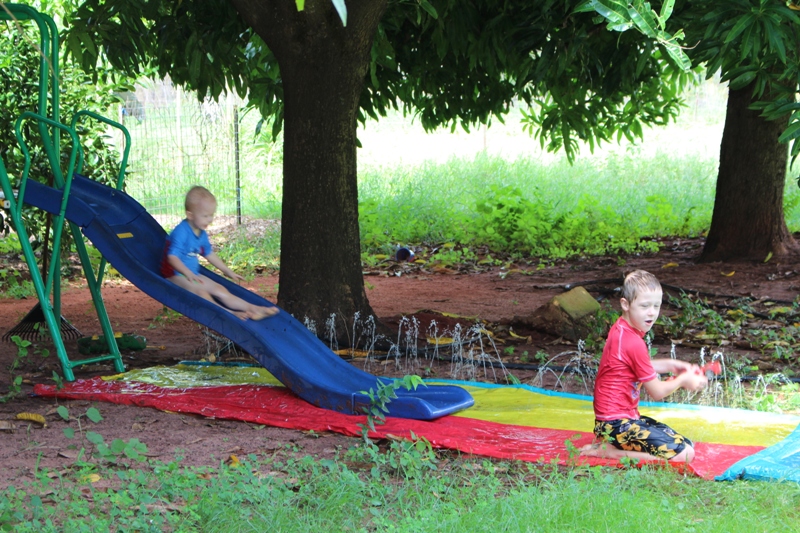 The simple things in life are often the most fun!
The simple things in life are often the most fun!
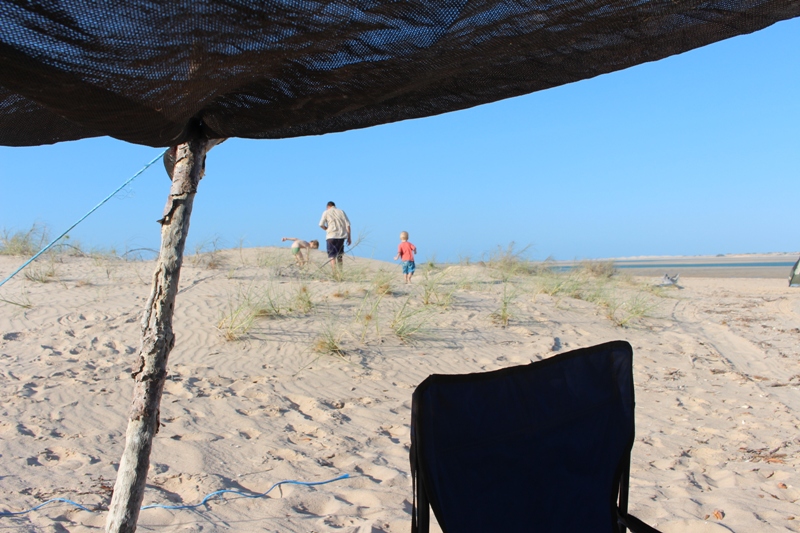 Beach camping.
Beach camping.
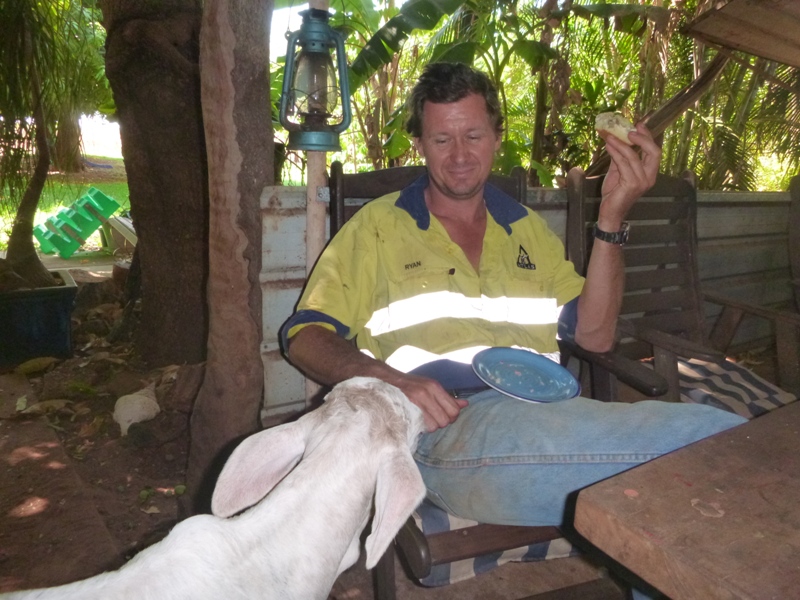 “Can I have some of your lunch too?” One of the many poddies that still needed milk. We keep them in the back yard so they can learn to graze on a variety of different things!
“Can I have some of your lunch too?” One of the many poddies that still needed milk. We keep them in the back yard so they can learn to graze on a variety of different things!
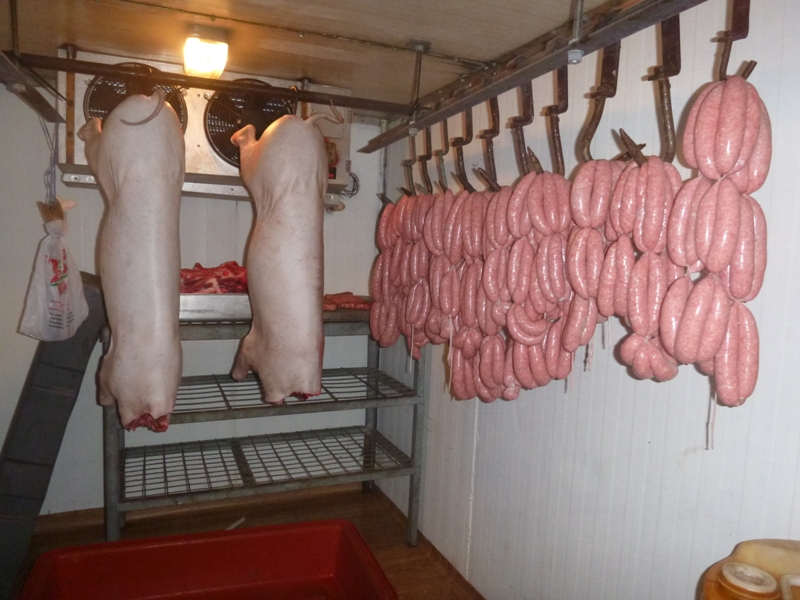 How much pork can one family eat? Lots when it’s home-grown and home butchered like ours.
How much pork can one family eat? Lots when it’s home-grown and home butchered like ours.
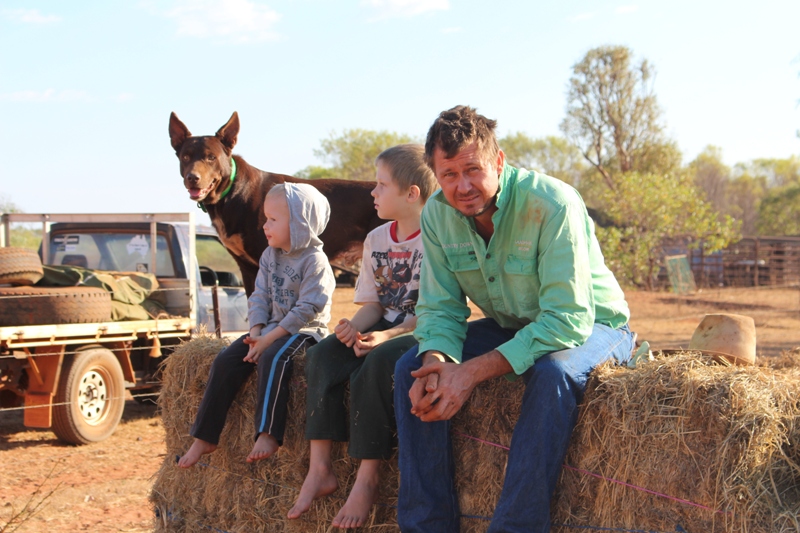 My boys! Family is everything.
My boys! Family is everything.
